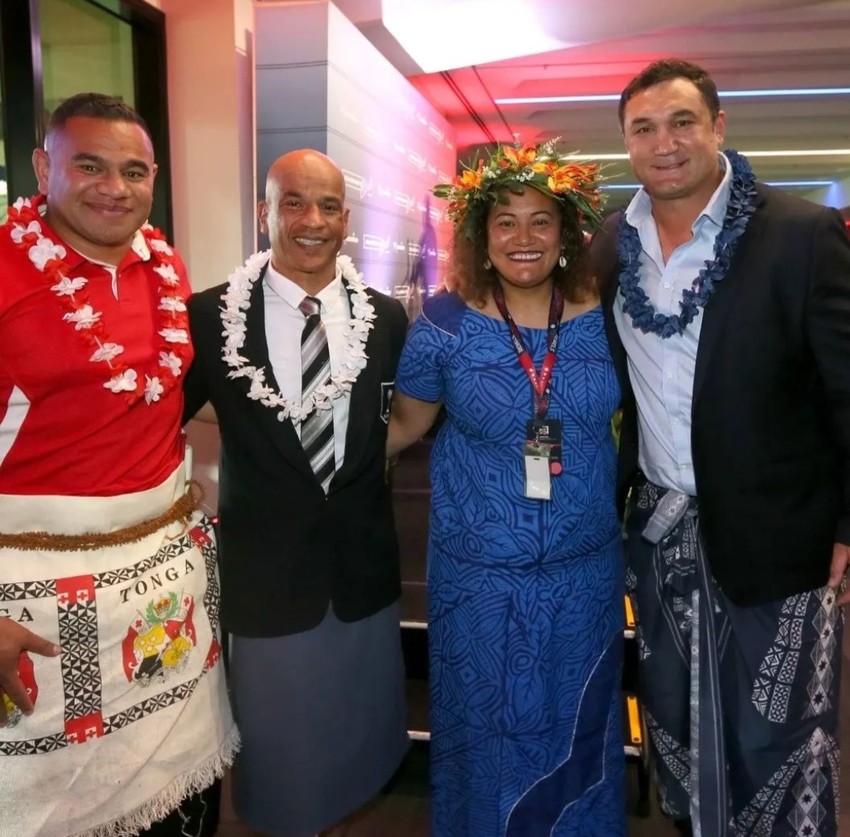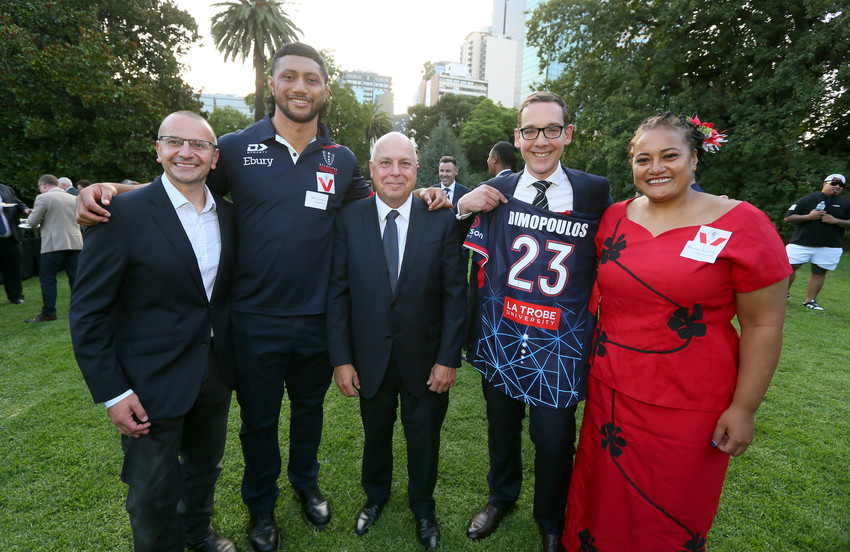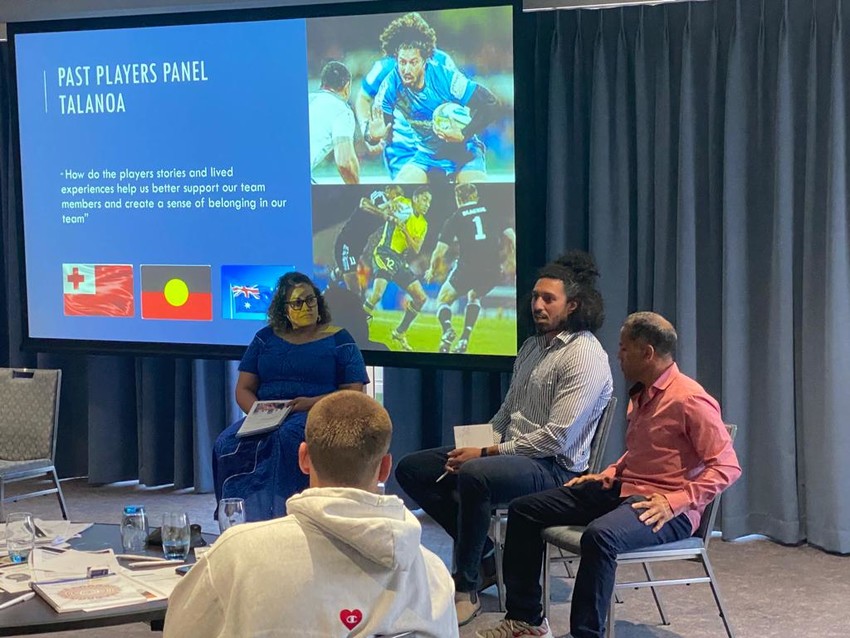WOMEN OF THE ISLANDS - FAAMOANA LEILUA
FAAMOANA LEILUA
RUPA National Cultural Leadership Manager & Player Development Manager for the Wallabies
Samoan
-
We originally interviewed Moana a few years ago when she was the Counties Manukau Steeles manager. Since then she has been appointed RUPA National Cultural Leadership Manager & Player Development Manager for the Wallabies.
RUPA CEO Justin Harrison says:
"Moana Leilua’s appointment as the National Cultural Leadership Manager & Wallabies Player Development Manager is a landmark moment for RUPA in our delivery of support services to players. Moana has an exceptional ability to connect with players and their families to foster their personal growth. Her deep understanding of players' diverse backgrounds and commitment to an inclusive environment make her ideally suited to this inaugural role. Moana embodies the values that drive RUPA forward, and we’re confident her leadership will empower players to thrive both on and off the field."
Moana says:
"O le ala ile pule ole tautua', the pathway to leadership is through service. A well known proverb amongst my community, and one that encapsulates this new adventure on Gadigal Land."
-
At the end of April 2023, World Rugby announced Moana as one of twelve recipients to be awarded the Capgemini Women in Rugby Leadership scholarship for her impactful work with the Rebels, RUPA and Rugby Australia.
Melbourne Rebels CEO Baden Stephenson said he was extremely proud of Leilua and her work with the Club.
“The announcement of this award is very timely as Moana heads off with the team to Auckland today to lead our Cultural Round efforts for our game against Moana Pasifika. Moana is a leader in this space globally in our sport and I couldn’t be prouder of her,” said Stephenson.
We were able to chat to Mo after this announcement was made - you can watch the interview with her in the video above and then find out more about her journey in our original interview with her below. (We've updated a couple of the questions/answers).

Cover photo & photo above by Gracie from Fiafia_Art
-
My name is Faamoana (Moana) Leilua. My late Father Lealali Taeatu Ieli hailed from the beautiful Fusi Safotulafai/Salelologa and my Mum Siufaga from Falevao/Falefa. My parents met in Avondale in the late 70s and made the move to Hamilton in the early 80s, where my family has laid their roots since. I am one of four (two sisters and one brother so fairly small for a Samoan family), a proud tamaita’i Sāmoa, and I’m currently contracted with the Counties Manukau Rugby Union as the Steelers Manager



You're currently the RUPA Player Development Manager for the Melbourne Rebels - can you tell us what this job entails?
A Player Development Manager (PDM) oversee the off field programme, which is called the Advantage Line for the professional players. I'm a huge believer that if we can get the 4pm - 8am right, the 8am - 4pm benefits, High Performance (HP) is a mindset and our service is to ensure that wellbeing and development of our players outside of rugby is kept front and centre. RUPA has 6 pillars which covers Careers and Education, Wellbeing, Financial Management, Cultural Awareness, Personal Toolkit (Life Skills), Integrity and Obligations, and another element that is part of my role is Family ( players families). Being immersed within the Club environment has enabled me to work closely with the HP Staff too, there is a strong focus on wellbeing, as we were one of the most affected teams during the C-19 years, and that focus has continued on to present day.


The Melbourne Rebels are a culturally diverse team, therefore some of the offerings on my end in relation to the Advantage Line is tailored accordingly to my player group. I've had opportunities to help in other areas too, from cultural advisor on events/commercial matters, community engagements through working groups, delivering cultural awareness workshops for development officers from Southern states & HP Staff from other Super Rugby Clubs, all in all while ensuring that the squad are engaged in their own personal development. No day is the same, and thankful that RUPA and the Club have allowed me to continue to develop other personal areas of interest such as Leadership and Governance; for instance, I completed a 1 year Observership Programme with a Not for Profit organisation called CARE Australia; designed and facilitated a bespoke Pacific Leadership Programme for the Pasefika cohort in 2022; and this season I'm working on a project with RUPA, which will focus on enabling members of our pacific professional player cohort in Australia to develop their leadership skills.


I pinch myself that I get to serve such a talented and awe-inspiring group of young players in Melbourne, seeing them flourish off field really brings me joy, some are running successful side hustles, others are studying, doing work experience, or volunteering/helping out in their own communities, and we have a few Dads in the team too! One of the most special things personally, is being able to connect with the players families and Parents/ Grandparents. Being able to look at a holistic view of wellbeing (it's what we as pasefika peoples know), I naturally have applied that into my role (s), and really grateful that its well received.
RUPA's purpose is to ensure that those we serve become better people, better players and live better lives, to tautua the professional players in this way is a real honour.


You were the only woman manager in the Mitre 10 Cup Competition & 1 of only 2 Pasifika managers when you managed the Counties Manukau Steelers - why was it relevant that a Pacific Woman was the Manager?
I am fully cognisant of the fact that there are two factors at play in my case, being of Pacific descent and a female in a space that has traditionally been male oriented and pale (and I say that in the nicest way possible). The fact that I may have more melanin than another, or that I am a woman should be secondary to my ability to perform the role, but I know that has not always been the case (in rugby or in other sectors).
I believe that the relevance lies in that those that I serve are predominantly of Pacific or Māori heritage, so there is an instant connection. Coming from similar backgrounds, having grown up with a lot of male cousins (church friends who became family, shout out to EFKS Hamilton), and the humour that we inject in our day to day, I believe has helped to bridge the gap, and there is also a mutual respect that exists as a result.


At the end of my first season with the Steelers (2016), the stars aligned (or a divine appointment), I was blessed with the markings of my ancestors alongside my brother Lealali Sale, thirty years after our Dad had gone through the same journey with Su’a Suluape Paulo II. I mention that, as it signifies being the protector for my family; although I do not have a family of my own yet (yet being the operative word – please Lord ha), everything that I have done since the ceremony (samaga), I take from that position as a protector of those that I am privileged to serve and serve alongside with.
I was once told that I have something special to offer being a Pacific Woman in business, I took that on board as an encouragement that I was on the right track, and to keep adding value, challenge the status quo, and all along moving forward and eventually upward.

What were the pathways that led you to where you are now?
I have been an avid rugby fan since I can remember. Our family supports Manu Samoa, All Blacks, Waikato (Mooloos), Gallagher Chiefs (however my nephew has decided that the Highlanders are more to his liking, gasshh) and now the Steelers of course. Rugby was not an option as a sport for girls back in my day, so netball was my vice throughout all my schooling years, When I moved to Auckland for University in the late 90s, I tagged along with my cousins who were going to a muster at Suburbs RFC when it was located at Racecourse Parade in Avondale, I caught the bug instantly. I played representative rugby for Auckland Storm and Thunder, Counties Manukau Heat, and was blessed to adorn the royal blue for Manu Sina Samoa and to represent the Motherland at RWC 2006 in West Edmonton Canada, most definitely the highlight of my on field rugby pursuits.

I had a break from rugby during my Dads battle with cancer in 2011 and volunteered to manage the Auckland Marist Womens team in 2012 (helped with the healing process after losing my Dad), and when I officially hung up my boots in 2014, I went on to manage Ardmore Marist Women’s team and co-managed the Counties Manukau Heat in 2015. That summer, I was asked to manage the Counties Manukau Mens 7’s team, and having never worked with a mens sports team before, it was a challenge that I accepted. I managed the Counties Manukau Mens 7s team for two seasons (voluntary), and post winning the National 7s Championship in 2016, I was offered the role as the Steelers Manager (first female and pacific person to have secured the role with Counties Manukau Steelers since it was established in 1955, when I heard that I was like, ok no pressure 😊).

I have previous work experience in middle management roles in contact centre operations, shipping and freight industry, recruitment experience within the tertiary education sector, and a few short-term contracts in events management; I believe all the roles that I have had to date has not only helped build my business acumen, but also led to where I am today. It’s not until I stopped and reflected upon what I had achieved, that it dawned on me that everything that I have learnt and adopted along the way professionally, the people that I have met in my various roles, have been critical to my journey to the Steelers. I am absolutely floored at how everything has fallen into place, and I believe that the fruits of my labour are slowly (but surely) being realised.



In Nov 2019, I was in Lautoka Fiji with the Black Ferns Development XV as their Team Manager for Oceania Champs. 2019 was also my final M10 Cup season with the Steelers ( served 4 seasons altogether), but I also knew the sport sector was where I wanted to serve long-term. I had specific things I was looking at if I went back to a fulltime gig; and the PDM Vacancy with RUPA landed in my inbox while on tour. I had only told a few of the ladies in the BF Dev Management Team, Whitney Hansen, Amanda Murphy and Gabrielle McCullogh (present day are all kicking a$$ in their respective roles in rugby and hockey), and they were so encouraging, so I submitted my CV. Initial call about my application came while in Lautoka, with the first interview taking place when we returned to Aotearoa!
Side note: We won the Oceania Championship by the way, I was so blessed that the Black Ferns Dev XV was my first (and only, who knows, may not be my last) national team I've managed. A proud moment seeing a number of those ladies go on to trepresent Aotearoa at RWC 2021, unbelieveably proud of them #wahinetoa).

It was nerve wracking, my first virtual job interview ( who knew that 4 months down the track that would become our norm), and the second interview was in Melbourne. Truth be told, it was a daunting second interview, as there was a panel of five, and fortunate that my professional and lived experience married up with the type of person they were looking for in a PDM for the Melbourne Rebels. The interview was in the morning, and I was offered the role in the afternoon, and within 2 weeks, I moved beyond the reef to Naarm. Whirlwind move is an understatement, and I think if I had longer to think about it, I never would have left Aotearoa. I'm now heading into my 4th season with RUPA and the Melbourne Rebels, and despite moving to Victoria in the year of C-19 ( we had 6 lockdowns), I'm so thankful for the amazing experiences, the places and spaces I've been blessed to access, and the inspiring people I get to work with and serve, since making the bold move across the Tasman.


My foundations were laid in Aotearoa, and I'm building on that here in Australia. The support and leadership from my Chief Justin Harrison and James Holbeck at RUPA, also Toby Duncan, as well as Baden Stephenson, Nick Stiles and Kevin Foote and the team at the Melbourne Rebels has been more than what I could have ever asked for. They've all created an environment where my work and my contribution is valued, and athlete wellbeing and a genuine appreciation and desire to be more culturally aware is a priority. Suffice to say, the move has resulted in exponential growth professionally, and I truly am thankful to be serving with two work families in Australia, in RUPA and the Melbourne Rebels.



You played international rugby for the Manu Sina. What are some of the biggest challenges and lessons you've learned as a Pasifika woman playing Rugby?
Challenges as a Pasifika Woman playing rugby:
In Pacific circles especially, rugby is probably not a sport that parents would see or want their daughters to participate in, however its evolved since I first started, and with more exposure eg: TV Coverage on Sky Sport, the introduction of girls 7s in schools, Womens 7s in the Commonwealth Games and Olympics, increased number of females working in rugby eg: Rugby Development Officers, Managers, Commentary team to name a few, they’ve become more accepting of girls and womens rugby as a whole. The recent statistics released from NZ Rugby further confirms the rising interest in rugby notably the female participation rates superceding that of their male counterparts.



Lessons learnt:
The profile of womens rugby wasn’t always as it was today (although I still believe there is a fair bit of a way to go despite all the good stuff).
Lessons learnt while playing rugby:
- Turn down the volume of the naysayers, and ramp up the voices of the cheerleaders and champions who are in your corner
- Empowering each other (sisterhood) and having a united front when times are tough
- Good work ethic will be rewarded in due time, patience is key, so keep on keeping on
- Your voice matters don’t be afraid to speak. What you have to say is important! Ask questions.
- Be authentic in all your dealings with players and Management alike, that will follow you beyond the rugby field, and you never know when the favour will be returned years down the track.



How does being Samoan impact your life?
It is the essence of who I am, at the core of all I do, and plays an integral part in how I approach life and work in all its fullness.
Being Samoan and a NZ born Samoan at that, navigating two worlds has meant striking a balance, knowing my role at home and my role at work may in some cases be markedly different, but at the core my values, integrity, and my family name will always go before me in all I do.

Who or what is your biggest inspiration and why?
My Parents. They both migrated to Aotearoa to seek a better future for themselves, with limited education and next to no English, they did they best they could with the little they had, raised four children in the Waikato away from the comforts of family in Auckland, worked two to three jobs at any given time to ensure that we could succeed in life, I am because of them (love you Foga and Ieli). All I’ve done pales in comparison to what my Parents achieved.



